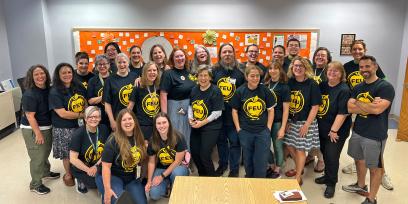A powerhouse of 27,500 education workers has unionized in Fairfax County, Va., to create the new Fairfax Education Unions, an alliance between the Fairfax County Federation of Teachers and the Fairfax Education Association. Announced June 10, the new AFT affiliate marks the largest U.S. public sector union victory in 25 years, posing a bold challenge to Virginia’s reputation as a right-to-work state once ranked the worst in the nation for workers.
“Today marks the culmination of a 47-year-long fight to win collective bargaining at Fairfax County Public Schools,” says FCFT President David Walrod. “We hope this huge milestone will inspire more wins for our union siblings in Virginia and across the country. This is undoubtedly a historic moment in Fairfax and a monumental step forward for labor.”
“Never underestimate the will of people to strive for a voice at work, no matter the odds,” says AFT President Randi Weingarten. “Whether they are bus drivers or teachers, these educators are devoted to their students and their work; they should have had the right to collective bargaining long ago. I have heard them express these aspirations for years, and, today, the struggle and faith paid off.”
On the ground
For all its national significance, the win in Fairfax is most meaningful to the individuals it affects: the teachers, custodians, social workers, bus drivers, librarians, teaching assistants, clerical employees and others who work every day in Fairfax County public schools. People like Ernesto Escalante, a building supervisor at Glen Forest Elementary School.
To save on day care, Escalante works the night shift and takes care of his two children, ages 10 months and 6 years, while his wife works during the day. “The yearly salary I get is not enough” to do otherwise, he says. In fact, he would take a second job if he could, but his schedule won’t permit it.
“A lot of the custodians have two, some of them have three, jobs,” says Escalante; they work in restaurants, construction, and cleaning retail stores and banks. Escalante hopes being unionized will open the door to higher pay and benefits so multiple jobs won’t be as necessary.
“In order to stay in Fairfax County on the kind of pay I’ve been getting … I have to work four jobs,” says Kit LaCroix, a kindergarten instructional assistant who also works as a theater technician, a babysitter and for Door Dash. She is also the single mom of a third-grader. “It’s a juggle, and it’s not sustainable. The students deserve someone who hasn’t worked 14 hours the day before in order to live in the ZIP code of the school.”
Greta Michaelson, a kindergarten teacher, also works multiple jobs—as a professional photographer and a babysitter. She has colleagues who can’t afford to live in Fairfax, so they drive from as far away as Pennsylvania and West Virginia, where housing is more affordable. And having summers off is a myth, she says; she doesn’t know any teachers who do this—unless they have high-income spouses.
“You shouldn’t have to work two and three jobs,” says Durann Thompson, a third-grade teacher and a member of the union board. “We have to be treated like the professionals we are.” That also includes having more planning time and better work-life balance, she says.
A voice on the job
Fairfax Education Unions members are looking forward to having more of a voice at work, and are especially eager to describe short staffing. “We do not have enough bodies in the room with 27 kindergartners in one class,” says LaCroix, who wants to address class size and see more paras hired to “take the load” off teachers who are swamped with administrative tasks.
Similarly, Escalante says custodians are stretched thin and must take on extra work—with no extra pay—when colleagues are sick or on vacation. And it’s hard to hire new workers to help out. “A lot of people are turning down jobs,” he says. “It’s a very physical job, and the payment is not good enough.”
Michaelson would like to see an instructional assistant in every kindergarten class, which doesn’t always happen. She also hopes for better family leave and more health insurance options.
“More than anything else, this win means that frontline employees of Fairfax County Public Schools now have a real voice at work,” says Fran Lewandoski, a social worker at Lemon Road Elementary School and an FCFT board member. “We have a voice about fair compensation and fair leave policies. We have a voice about safe working conditions. Our voices have been elevated through this election and through the legally binding contract we will negotiate with FCPS. We are ready.”
“I’m excited to continue working toward a better school system,” says Michaelson. “Happy teachers will equal happy students and families.”
Elections matter
The kernel of this win began when pro-public school candidates won statewide elections in 2019. Consequently, the state Legislature passed laws in 2020, which took effect in 2021, that allow collective bargaining for public sector workplaces. Then, with the alliance of AFT and NEA affiliates, the more powerful FEU came together: The union won two one-week votes by a combined 9 to 1 margin, with 97 percent voting yes in the instructional unit and 81 percent in the operational unit.
In a letter to organizers just after they filed for an election, Weingarten pointed out the significance of the labor movement, calling it especially important in Virginia. “It’s more important than ever that working people have a voice on the job, and in their democracy,” wrote Weingarten. “As we approach more high-stakes elections this year, our collective power as a union will help us mobilize to elect folks who stand with working people and protect public education and what’s what best for our students, families and communities.”
[Virginia Myers]


